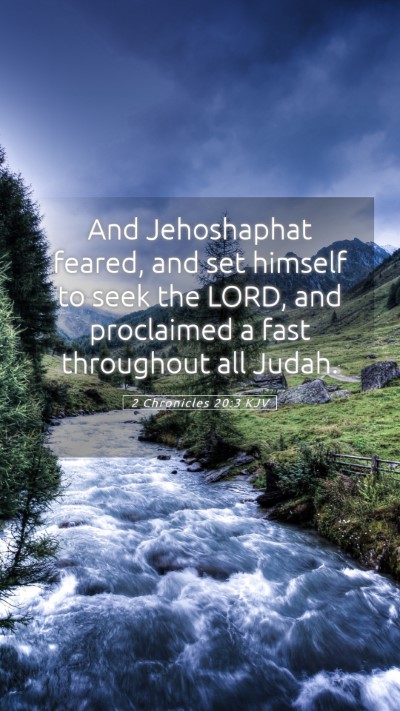Understanding 2 Chronicles 20:3
Bible Verse: 2 Chronicles 20:3
"And Jehoshaphat feared, and set himself to seek the LORD, and proclaimed a fast throughout all Judah."
Overview
This verse from 2 Chronicles captures a critical moment in the reign of King Jehoshaphat of Judah. Faced with a significant threat from invading armies, Jehoshaphat's initial response is one of fear, prompting him to turn to God in prayer and fasting. This action reveals his understanding of the need for divine intervention in dire circumstances.
Bible Verse Meanings
-
Fear and Trust:
Jehoshaphat's fear indicates a natural human response to overwhelming danger. However, unlike succumbing to fear, he chooses to pursue the LORD, demonstrating that seeking God is the proper response to anxiety.
-
Seeking the LORD:
Setting oneself to seek the LORD signifies intentionality in prayer and worship. It highlights the importance of placing God at the center of our concerns and seeking His guidance during trials.
-
Proclamation of Fasting:
The act of calling for a fast emphasizes communal repentance and a humble approach toward God. It symbolizes a desire for spiritual renewal and dependence on God’s mercy and power.
Bible Verse Interpretations
Commentators like Matthew Henry and Albert Barnes emphasize that Jehoshaphat’s response is an excellent model of leadership in crisis. His call to fasting shows an understanding that spiritual matters are paramount when facing physical challenges.
Adam Clarke points out that the fear Jehoshaphat experienced did not deter him from taking immediate action, but rather prompted a decisive spiritual response, showcasing that fear can lead to faith if directed toward God.
Bible Verse Understanding
The historical context of this verse reflects a time when Judah was threatened by multiple enemies. Jehoshaphat's reign was marked by attempts to reform and lead his people back to the true worship of God. This setting illustrates not just personal devotion but a national call to prayer, emphasizing the power of collective faith.
Bible Study Insights
In discussing this verse in Bible study groups, participants can explore how fear can act as a catalyst for drawing closer to God rather than driving one away. The communal aspect of fasting can lead to discussions on unity in prayer among believers.
Tools such as Bible study resources and Bible study guides can provide deeper insights into the significance of Jehoshaphat’s actions and the broader implications for modern readers.
Application of the Verse
Applying the lessons from 2 Chronicles 20:3 in daily life involves recognizing moments of fear or anxiety and encouraging individuals to turn towards God. By prioritizing prayer and fasting, believers can cultivate a deeper reliance on God’s strength amid their struggles.
Additional Cross References
- Psalm 34:4: “I sought the LORD, and he answered me.”
- James 4:10: “Humble yourselves before the Lord, and he will exalt you.”
- 2 Chronicles 7:14: “If my people, who are called by my name, will humble themselves and pray…”
Conclusion
In conclusion, 2 Chronicles 20:3 serves as a powerful reminder of the importance of fearlessness rooted in faith. The king's actions illustrate the profound impact of seeking God through prayer and fasting, providing a model for individuals and communities facing their own fears and challenges. Understanding this scripture not only enriches one's personal faith journey but also forms a foundation for communal spiritual growth.


